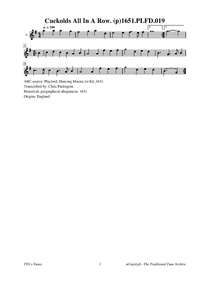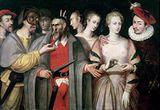Template:Pagina principale/Vetrina: Difference between revisions
No edit summary |
No edit summary |
||
| Line 1: | Line 1: | ||
{{SheetMusic | {{SheetMusic | ||
|f_track= | |f_track=Cuckolds All in a Row.mp3 | ||
|f_pdf= | |f_pdf=Cuckolds All In A Row.pdf | ||
|f_artwork= | |f_artwork=Cuckold.jpg | ||
|f_tune_name= | |f_tune_name=Cuckolds All in a Row | ||
|f_track_title= | |f_track_title=Cuckolds All in a Row | ||
|f_section= | |f_section=abc | ||
|f_played_by=[https://soundcloud.com/ | |f_played_by=[https://soundcloud.com/erasmustalbot-music Erasmus Talbot] | ||
|f_notes= Glen Collection of printed music: Songs of Scotland prior to Burns. | |f_notes= Glen Collection of printed music: Songs of Scotland prior to Burns. | ||
|f_caption=The song is a description of the adventures of a whirligig maker or wood turner in the pursuit of a runaway galloway or pony, and the ingenious way in which the names of the different localities are interwoven with the story reveal a marvelous command of the rhyming faculty. | |f_caption=The song is a description of the adventures of a whirligig maker or wood turner in the pursuit of a runaway galloway or pony, and the ingenious way in which the names of the different localities are interwoven with the story reveal a marvelous command of the rhyming faculty. | ||
|f_source=[https://soundcloud.com/ | |f_source=[https://soundcloud.com/erasmustalbot-music/cuckolds-all-in-a-row Soundcloud] | ||
|f_pix=420 | |f_pix=420 | ||
|f_picpix=200 | |f_picpix=200 | ||
|f_article=[[ | |f_article=[[Cuckolds All in a Row | '''Cuckolds All in a Row''']] | ||
''' | The latter song heaped abuse on the citizens of that town for siding against the King in the civil wars, and began "You coward-hearted citizens..."; it is printed in '''Rats rhimed to Death; or, The Rump Parliament hanged in the Shambles''' (1660) and in both editions of '''Loyal Songs written against the Rump Parliament'''. "Culcolds All a Row" is mentioned in the older song "O London in a fine town." Cuckoldry was frequently the topic of comic productions and ordinary jests in the early decades of the 17th century. Keith Whitlock ("John Playford's The English Dancing Master 1650/1 as Cultural Politics", '''Folk Music Journal''', vol. 7, No. 5, 1999) suggests this stemmed from the annulment by King James VI/I of the marriage between the Earl of Essex and Lady Frances Howard, which resulted in a famous scandal and murder. The two principals were both barely out of puberty when they were wed in a political union, but quckly separated before the marriage could be consummated. Essex was sent abroad on an extended tour, and meanwhile Frances had found a new love in the 1st Earl of Somerset. When he returned they spurned one another, each decrying the incompatibility of the other; Frances's virginity was physically checked by committee, but a stand-in may have actually been examined. Sir Thomas Overbury, a close friend and advisor of Somerset, had tried to advise Somerset of the unsuitability of Frances, but the Howard family was anxious to see them wed, if only they could free her of her previous commitment to Essex. They were able to maneuver Overbury into disfavor with the King and he was imprisoned and then poisoned, allegedly by Frances and Somerset. This removed the last obstacle to Frances and Somerset and they were married, but the crime was revealed and the couple sent to the Tower of London. She was found guilty in a subsequent trail but spared execution, and was eventually pardoned by the King and released in early 1622. Cuckolds became the subject of ridicule in period broadside ballads and masquerades. | ||
}} | }} | ||
Revision as of 09:53, 4 June 2023

Played by: Erasmus Talbot
Source: Soundcloud
Image: Glen Collection of printed music: Songs of Scotland prior to Burns.

The latter song heaped abuse on the citizens of that town for siding against the King in the civil wars, and began "You coward-hearted citizens..."; it is printed in Rats rhimed to Death; or, The Rump Parliament hanged in the Shambles (1660) and in both editions of Loyal Songs written against the Rump Parliament. "Culcolds All a Row" is mentioned in the older song "O London in a fine town." Cuckoldry was frequently the topic of comic productions and ordinary jests in the early decades of the 17th century. Keith Whitlock ("John Playford's The English Dancing Master 1650/1 as Cultural Politics", Folk Music Journal, vol. 7, No. 5, 1999) suggests this stemmed from the annulment by King James VI/I of the marriage between the Earl of Essex and Lady Frances Howard, which resulted in a famous scandal and murder. The two principals were both barely out of puberty when they were wed in a political union, but quckly separated before the marriage could be consummated. Essex was sent abroad on an extended tour, and meanwhile Frances had found a new love in the 1st Earl of Somerset. When he returned they spurned one another, each decrying the incompatibility of the other; Frances's virginity was physically checked by committee, but a stand-in may have actually been examined. Sir Thomas Overbury, a close friend and advisor of Somerset, had tried to advise Somerset of the unsuitability of Frances, but the Howard family was anxious to see them wed, if only they could free her of her previous commitment to Essex. They were able to maneuver Overbury into disfavor with the King and he was imprisoned and then poisoned, allegedly by Frances and Somerset. This removed the last obstacle to Frances and Somerset and they were married, but the crime was revealed and the couple sent to the Tower of London. She was found guilty in a subsequent trail but spared execution, and was eventually pardoned by the King and released in early 1622. Cuckolds became the subject of ridicule in period broadside ballads and masquerades.
...more at: Cuckolds All in a Row - full Score(s) and Annotations
X: 1 T:Cuckolds All In A Row. (p)1651.PLFD.019 M:6/4 L:1/4 Q:3/4=100 S:Playford, Dancing Master,1st Ed.,1651. O:England H:1651. Z:Chris Partington. K:G V:1 clef=treble name="1." [V:1] a2 a a2 g|f2 g a2 d|e2 e f>ef|[1g6:|[2g3-g2| |:B|cdc BAB|A2 A fef|g2 d e d2|B3 G>AB| c>dc B>AB|A2 A fef|g2 d e d2|(B3G2):|
